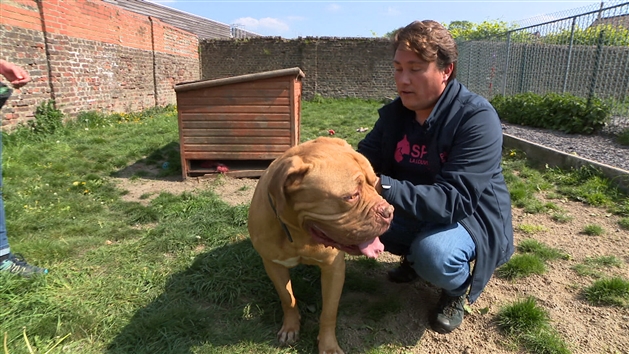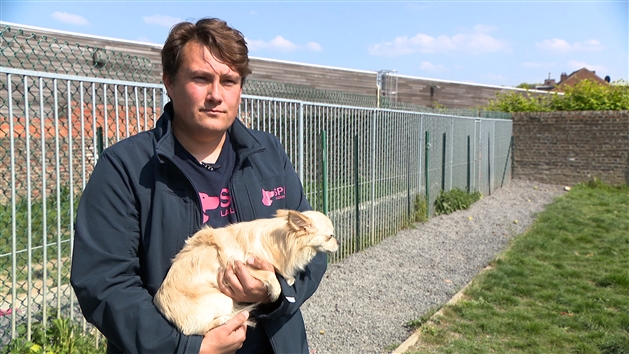Sandrine pushed the orange Alert us button to denounce animal donations on the Internet, which increase more in spring and summer. Every day, this resident of La Bruyère, in the Namur region, sees new ads on Facebook, while this practice has been banned since 2017.
“I am, like every year, challenged by the issue of donated kittens on social networks. The donation of animals is prohibited on Facebook, except on specialized pages. Every day, I see animals to give away: dogs, cats , barnyard animals, sheep, etc. Where are the controls for these pages? What can be done to stop these publications?, writes Sandrine via the orange Alert us button. In the midst of kitten births, donation ads abound on social networks. But it’s not just that. Chihuahua, ram or dwarf rabbit, Shepherd Malinois… A glance at the Facebook groups and Sandrine is scandalized. “There are also guinea pigs, geese… We even give mice. There really is everything”she reacts.
Active for more than 20 years in the protection of animals and volunteer in shelters, she tells us that she is appalled by this practice. In addition to being totally illegal and prohibited since June 2017, Sandrine sees it above all as an open door to animal abuse, especially when we know that from the 1er July, it will be necessary to present a license of detention to acquire a pet. “Clearly, people who are in default with respect to the detention permit will turn to this kind of group to have animals… And there, we are open to all abuses possible”, emphasizes this resident of La Bruyère, in Namur.
When you give an animal on social networks, there is no control behind
The problem, according to her, is the lack of supervision. “When you give an animal on social networks, there is no control behind it. We are not going to ask for a detention permit, there will be no adoption contract. If the animal is a problem, no refuge has the power to recover it… It is really very dangerous”, continues the forties. Owner of two American Staff, Sandrine takes the example of this breed which absolutely needs rigor and the ability to spend enough time. “VSThese are dogs that must be supervised before being put into the hands of people, especially private individuals.she says. On social networks, people are based on a physical. ‘Because the dog is beautiful, I will take it’. But this is not a good reflex to adopt. It’s impulsive, at the moment…”
For her, it is essential to match the profile of the adopter with that of the animal. And even more so when it comes to Amstaff. “When you adopt an animal from a shelter, you have the advice of an animal handler who will give you the ‘characteristics’ and the profile of the dog, tell you if it can be suitable or not. Whereas on the Internet, you will not have not the right information and there will be no protection security for this animal either. When you want to adopt an animal, you have to get to know it and it has to match both ways. It has to accept us and we , we have to accept it”adds the Namuroise.
Sandrine and her dog. © RTL INFO
On the Internet, you will recover an animal without necessarily knowing its past and without knowing if it could correspond to what you are looking for. “There may be some character traits that aren’t going to go over well with him, he may not get along with other dogs, he may not like children… There are full of parameters that come into account when making the decision to acquire an animal”insists Sandrine.
The animal will probably not be in good health either, as is the case when it is adopted from a shelter. “On social networks, we find animals that are not castrated, not identified… And with the ‘fad effect’ dogs like the American Bully, some people collect them to breed. They then sell the puppies in them. selling, without having done health examinations before and therefore they can suffer from respiratory or hip problems, for example, and this affects the puppies when they will be sold at a high price. control”laments our interlocutor.
Raising awareness of animal donation
For her, it is therefore important to make people aware of the donation of animals on the Internet. But Sandrine is not the only one who wants to fight against this practice. Shelters and associations are on the front line in this fight. “The problem with donations is really impunitypoints out Gaëtan Sgualdino, president of the SPA in La Louvière. Despite it being forbidden, people give their animals away, they sell them, they sometimes breed in a totally wild way, thinking that, in any case, they will never be caught.”
During illegal donations of animals on the Internet, the identification of the animal is rarely updated. It therefore becomes impossible for a shelter to find the real owners without initiating an investigation or in-depth research. “We have a 5-year-old dog, Eros, who arrived at the shelter over a year ago. This poor animal was abandoned and tied up along the canal here in La Louvièreexplains the president of the SPA. When we called the owner indicated on the chip, he told us that it was no longer his dog, that he had given it away. The next one told us the same thing and we discovered that Eros had been given 7 times via classified ads on social networks…”

Eros was dropped 7 times. © RTL INFO
Gaëtan also tells us the story of a little chihuahua, who had just been abandoned the day of our shoot. “He arrived this morninghe tells us. Basically, he comes from Liège and he arrived in La Louvière. People came to drop him off saying they had found him when in fact it was their dog, they had gotten him over the internet.” These people wanted to get rid of him, because he had bitten a person in the street. But as the office of the Walloon Minister for Animal Welfare reminds us, “adoptedr or to buy an animal, it is to welcome a companion of life. Such an act is not done lightly, and the many implications must be thought out beforehand.”
Yet, even today, too many adoptions are made impulsively. “However, adopting an animal is really having responsibilities”, underlines Nicolas Yernaux, spokesperson for the Public Service of Wallonia (SPW). The ban on selling or giving animals on the Internet or via classified ads pursues, according to him, objectives in terms of animal welfare. “It is to fight against trafficking, avoid impulsive purchases of animals, regulate adoptions more generally and, consequently, avoid too frequent abandonments at the dawn of the summer holidays, as we will still experience this year. “

This little chihuahua was abandoned at the La Louvière SPA. © RTL INFO
To do this, the Walloon Minister for Animal Welfare, Céline Tellier, has “mandated the administration to pay particular attention to this issue, especially at the time of confinement”, informs us his office. Period, it is true, during which a lot of ads, especially for kittens, have emerged on social networks. Several warnings and statements of offense have already been drafted in this regard. “For example, the service of the Sanctioning Official condemned a generalist site which published advertisements for the sale of animals. An appeal was dismissed, and the site was obliged to withdraw the illegal publications”details the minister’s office.
Control is extremely difficult on social networks
But controlling this practice on social networks is extremely difficult, because the identity of the offender is not known. “Most advertisers use pseudonyms and open a profile only to place ads, which makes it difficult to identify them. The administrators of these pages use the same principle, and the Animal Welfare Unit does not fail to pass on to them warning messages.”
Depending on the type of offence, fines can range from 50 to 10,000 euros, concludes the SPW spokesperson.